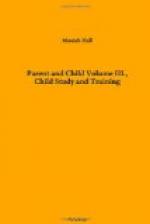Did you ever think that it is the most marvelous thing in the world that such a thing as a chicken ever comes out of such a thing as an egg? If only one chicken were hatched in a century, we would go from here to the Himalaya mountains to see the miracle of that chicken coming out of that egg. You put an egg under a very stupid old hen, and all the hen does is to keep that egg warm, and leave it alone; after twenty days there comes out a chicken. How in the world did that chicken ever frame that body? How did it build the skeleton and string the muscles, and spin the nerves? If every nerve in that body did not make just the right connection, that chicken would be paralyzed. If you could watch the development of that chicken in the egg, your hair would stand on end. Isn’t it Nature that makes those chickens? You and I can’t make them. Nature puts a shell around the egg with the express purpose that we are to keep our fingers out and let her alone. She says: “I am on very important business now and I am going to do some strange things; if you could watch me you would interfere with me, and if you interfere with me, you will ruin me or ruin the chicken, so I want you to stand to one side and leave me entirely alone; and while I might do a good many things that you don’t like, I shall bring a chicken out of that egg;” and she does; she has been making them for thousands of years in that same old stupid way, but she brings the chicken out all right.
Sometimes she seems to blunder still worse. She takes an egg which we suppose is going to turn into a frog, and she brings out of it a tadpole—neither fish, flesh nor fowl nor anything else. After a while the tadpole gets legs and has a long tail; it must lose that tail in order to become a frog. A benevolent zoologist one day started in to help the tadpole by snipping off the tadpole’s tail; he made a frog of him in a hurry, but the strange thing was that that frog never was able to leap properly. Nature had been relying on the material that was in the tail. She was going to shift it forward and put it in the hind legs, but when the zoologist cut it off, she couldn’t build the hind legs right after that.
A good deal of our education seems to me like trying to make frogs in a hurry by cutting off their tails. Nature can make chickens; she can make frogs. She can make bugs that will eat up everything which human ingenuity ever tried to raise. She will make weeds which you and I can’t possibly kill even though we fight against them all summer long. We can trust Nature to form these things; isn’t it fair to trust her with the children for a little while at least? Wouldn’t it be well—I never heard of this experiment being tried, but I should like to see it tried very much indeed—I do wish that sometime somebody would leave a baby alone for twenty minutes and see what it would do if it were left to itself.




